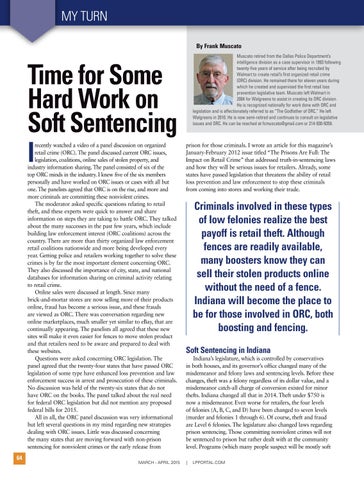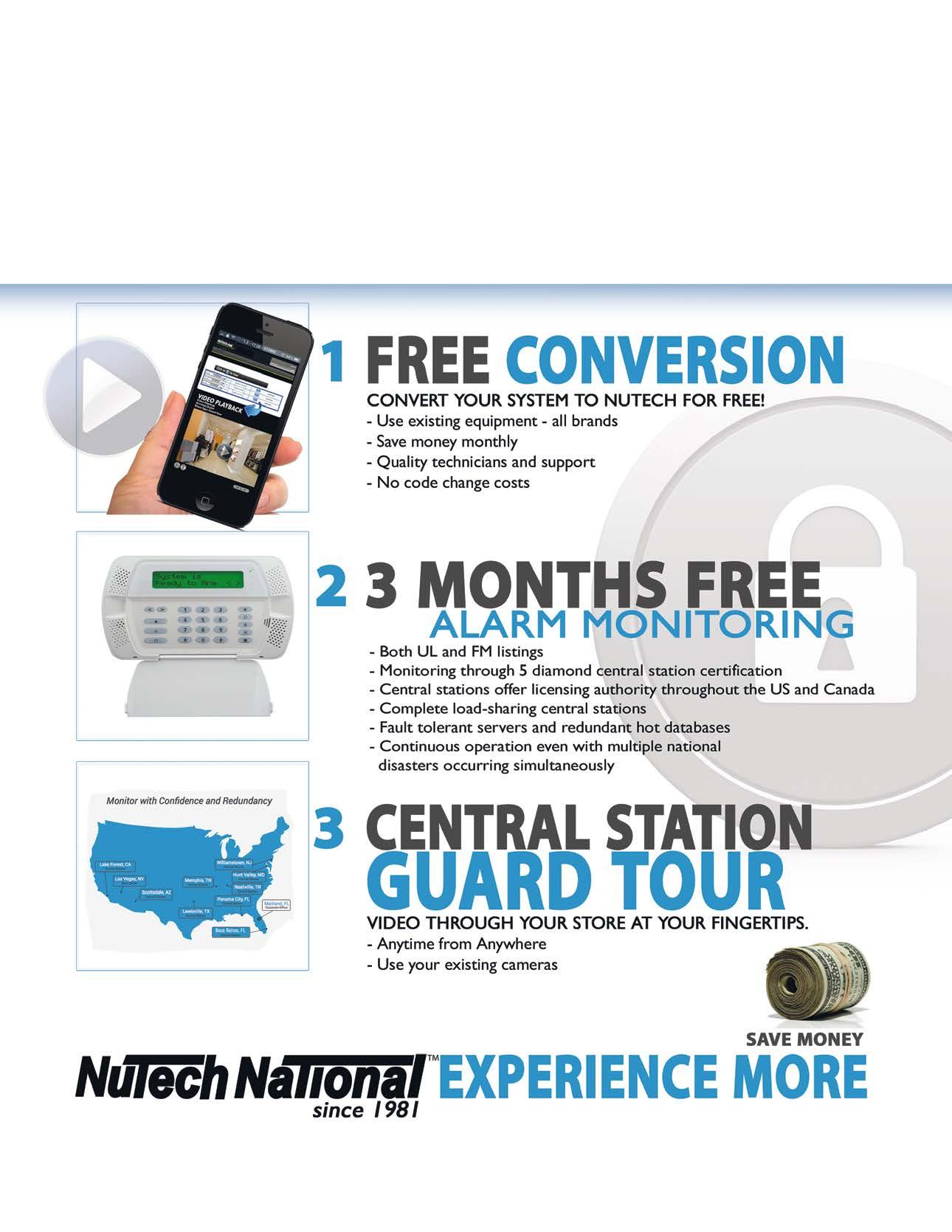MY TURN By Frank Muscato
Time for Some Hard Work on Soft Sentencing I recently watched a video of a panel discussion on organized retail crime (ORC). The panel discussed current ORC issues, legislation, coalitions, online sales of stolen property, and industry information sharing. The panel consisted of six of the top ORC minds in the industry. I knew five of the six members personally and have worked on ORC issues or cases with all but one. The panelists agreed that ORC is on the rise, and more and more criminals are committing these nonviolent crimes. The moderator asked specific questions relating to retail theft, and these experts were quick to answer and share information on steps they are taking to battle ORC. They talked about the many successes in the past few years, which include building law enforcement interest (ORC coalitions) across the country. There are more than thirty organized law enforcement retail coalitions nationwide and more being developed every year. Getting police and retailers working together to solve these crimes is by far the most important element concerning ORC. They also discussed the importance of city, state, and national databases for information sharing on criminal activity relating to retail crime. Online sales were discussed at length. Since many brick-and-mortar stores are now selling more of their products online, fraud has become a serious issue, and these frauds are viewed as ORC. There was conversation regarding new online marketplaces, much smaller yet similar to eBay, that are continually appearing. The panelists all agreed that these new sites will make it even easier for fences to move stolen product and that retailers need to be aware and prepared to deal with these websites. Questions were asked concerning ORC legislation. The panel agreed that the twenty-four states that have passed ORC legislation of some type have enhanced loss prevention and law enforcement success in arrest and prosecution of these criminals. No discussion was held of the twenty-six states that do not have ORC on the books. The panel talked about the real need for federal ORC legislation but did not mention any proposed federal bills for 2015. All in all, the ORC panel discussion was very informational but left several questions in my mind regarding new strategies dealing with ORC issues. Little was discussed concerning the many states that are moving forward with non-prison sentencing for nonviolent crimes or the early release from
64
MARCH - APRIL 2015
Muscato retired from the Dallas Police Department’s intelligence division as a case supervisor in 1993 following twenty-five years of service after being recruited by Walmart to create retail’s first organized retail crime (ORC) division. He remained there for eleven years during which he created and supervised the first retail loss prevention legislative team. Muscato left Walmart in 2004 for Walgreens to assist in creating its ORC division. He is recognized nationally for work done with ORC and legislation and is affectionately referred to as “The Godfather of ORC.” He left Walgreens in 2010. He is now semi-retired and continues to consult on legislative issues and ORC. He can be reached at fcmuscato@gmail.com or 214-930-9359.
prison for those criminals. I wrote an article for this magazine’s January-February 2012 issue titled “The Prisons Are Full: The Impact on Retail Crime” that addressed truth-in-sentencing laws and how they will be serious issues for retailers. Already, some states have passed legislation that threatens the ability of retail loss prevention and law enforcement to stop these criminals from coming into stores and working their trade.
Criminals involved in these types of low felonies realize the best payoff is retail theft. Although fences are readily available, many boosters know they can sell their stolen products online without the need of a fence. Indiana will become the place to be for those involved in ORC, both boosting and fencing. Soft Sentencing in Indiana
Indiana’s legislature, which is controlled by conservatives in both houses, and its governor’s office changed many of the misdemeanor and felony laws and sentencing levels. Before these changes, theft was a felony regardless of its dollar value, and a misdemeanor catch-all charge of conversion existed for minor thefts. Indiana changed all that in 2014. Theft under $750 is now a misdemeanor. Even worse for retailers, the four levels of felonies (A, B, C, and D) have been changed to seven levels (murder and felonies 1 through 6). Of course, theft and fraud are Level 6 felonies. The legislature also changed laws regarding prison sentencing. Those committing nonviolent crimes will not be sentenced to prison but rather dealt with at the community level. Programs (which many people suspect will be mostly soft |
LPPORTAL.COM









